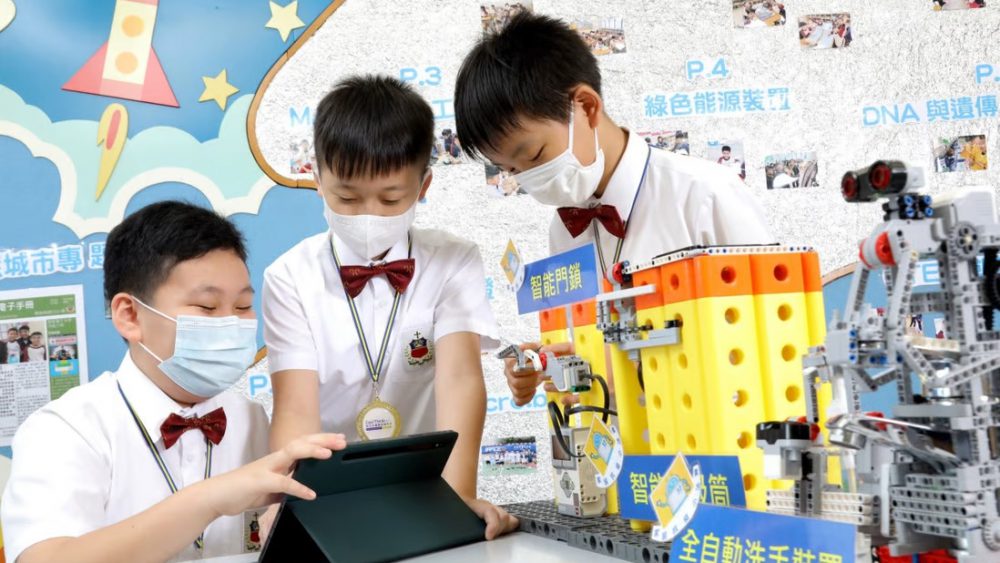The Covid-19 pandemic continues to cause a huge impact to the world. Hong Kong, despite its valiant earlier efforts in fighting the coronavirus, is no exception.
Children living with the current uncertainties may lack the skills to handle the challenges of today and tomorrow. Yet all is not lost, as these skills can be developed, and are currently being displayed by children proudly demonstrating their ability to adapt by utilising one of the most essential skills of the 21st century – computational thinking. Empowered with the ability to think computationally, these children have developed creative inventions to solve problems and deliver social good.
Computational thinking at a glance
Computational thinking is a problem-solving process that can be applied to everyday situations. It sees complex problems dissected using a skill set of decomposition, pattern recognition, pattern abstraction and algorithmic thinking, with possible solutions devised and presented in a manner that can be understood by both humans and computers.
“Coding and computational thinking are sometimes referred to interchangeably, but they are not direct equivalents,” says Daniel Lai, Programme Director of CoolThink@JC, a computational thinking scheme created and funded by The Hong Kong Jockey Club Charities Trust. “Computational thinking is the thought process required to write good codes. It trains learners to think like computer scientists, who can demonstrate abilities such as logical thinking, problem-solving and abstraction, and disaggregate complex problems into smaller, solvable parts.”
With the launch of CoolThink@JC in 2016, The Hong Kong Jockey Club placed itself at the forefront of computational thinking education. The scheme consists of a three-year programme for upper primary school students that aims to inspire digital creativity and nurture the proactive use of technologies.
Participants use their training to design inventions aimed at solving community problems, which are entered into the annual CoolThink@JC Competition. Entries from the last two years have showcased a creative range of ideas inspired by the challenges of the pandemic.
Device to fight the pandemic at home
One of the highlights of the 2020 competition was an invention that won first prize in the App Inventor category. Called the Smart Home Pandemic Fighter, the invention – which included a smart home device that required the students to apply technical knowledge in areas such as mechanical assembly, hardware control and coding – took almost three months to complete.
The app was created by students from Chan Sui Ki (La Salle) Primary School, and utilises a four-in-one smart device to remind family members to conduct disinfectant procedures upon arriving at home. The app is programmed to send messages to parents, informing them whether or not their children have completed the task.
The students’ teacher-adviser, Anthony Wong Chi-hung, says: “Their resourcefulness and problem-solving skills were on full display … they had to find methods to fix bugs themselves, such as by watching videos on YouTube. Their self-learning capabilities exceeded our expectations.”
Restroom auto-flushing device
Another invention that garnered attention was an auto-flushing device made by students from King’s College Old Boys’ Association Primary School No 2, who were concerned about public restroom hygiene.
The student team had observed a lack of good hygiene habits – for example, some people not putting the lid down after using the toilet in high-usage areas such as schools and shopping malls.
The smart device can auto-flush toilets once the lid is lowered, by sensing overall light levels. Other technologies including an ultrasonic sensor were used to detect and collect data about the usage rates for different bathroom stalls, and then automatically flushes those toilets during peak times.
The student inventors believe that staying healthy is most important, so they wanted to reduce the possibility of people getting sick by reducing the amount of contact they have to make with different surfaces.
Their teacher-adviser, Chan King-hong, says: “The Covid-19 pandemic is critical, and there are many people trying to get through tough times. I’m proud of my students’ ability to transform good intentions into something that delivers social impact. It might not be enough to really turn things around, but everyone can contribute a little.”
Social-distancing wristband
A 3-in-1 wristband developed by students from Marymount Primary School primarily operates as a temperature and social-distancing monitor, using an ultrasound sensor to gauge the distance between the wearer and other people nearby. The wristband wearer is notified when others are neglecting to maintain social distancing.
The group’s teacher-adviser, Tony Lam, says: “Every child likes to play and can find joy in their journey of learning to code. It is a journey sometimes riddled with mind-boggling challenges along the way, but it is also a meaningful process of self-discovery.”
Inspiring creativity and social awareness
These young inventors – who have demonstrated outstanding problem-solving skills, creativity and a great sense of social responsibility – are beneficiaries of the computational thinking education that is being provided by CoolThink@JC. Along with The Hong Kong Jockey Club Charities Trust, the scheme was also co-created by the Education University of Hong Kong, Massachusetts Institute of Technology and City University of Hong Kong, and is supported by the Education Bureau of Hong Kong.
A typical CoolThink@JC lesson features four learning and practising steps: to play, to think, to code and to reflect. The scheme is primarily designed to contribute to the development of computational thinking skills by empowering students to become thinkers and creators of technology.
“It’s hard to predict what the future holds for children, but with how fast things are changing in our world, a lot of knowledge learned at school may be outdated by the time they finish their education,” Lai says. “Being able to think computationally, and thus problem-solve well, will give them a head start in every stage of life, and an edge over competitors amid uncertain times.”
To read more articles on South China Morning Post related to Coolthink@JC




Comments are closed.